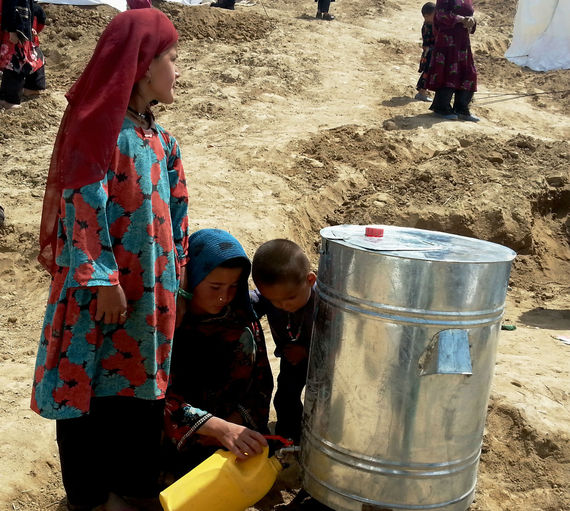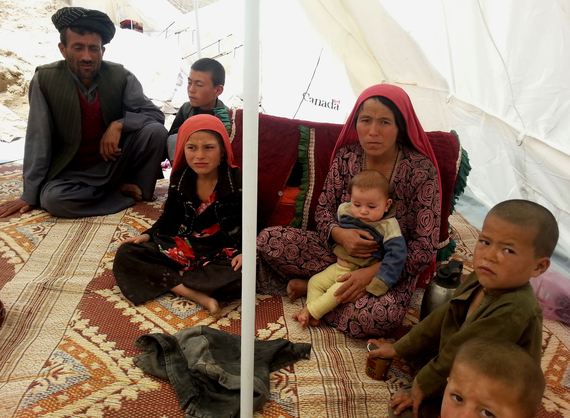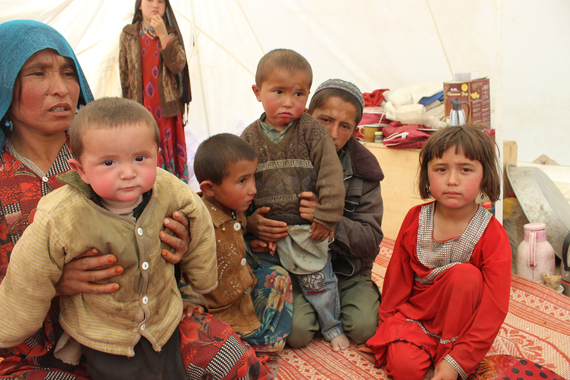Aab Bareek, Afghanistan -- Bigum Qal lost her husband and three of her sons in the landslides that hit this remote village in northeastern Afghanistan on May 2, but she hasn't had time to mourn. She broke her own leg -- now bandaged but still untreated -- while trying unsuccessfully to pull her husband from the second mudslide. Of her immediate family, only her youngest son survived.
Getting relief aid is difficult for her -- it has arrived in the village, but Bigum Qal can't move due to her injury, and her son is too young to hoist and carry the relief items. Neighbors managed to secure her one bag of wheat flour and one can of oil, but now she is afraid if she leaves to seek medical help, someone will steal these meager supplies.
As Afghans struggle to recover from the deadly landslides, Concern Worldwide has been working to identify the most affected and needy families and supply them with emergency shelter, non-food items and water containers.

It is not a job without challenges. Along with a flow of sympathy for this struggling community, a lack of coordination and strategy has been apparent as residents from other villages, often poor themselves, try to benefit from the large scale relief supplies, and high-profile visitors test efforts at crowd management and distribution. Tension has grown on the ground as frustrated and desperate survivors of the sudden disaster struggle to survive with little food or shelter, limited cooking fuel, no utensils.
One of my early mentors in humanitarian work told me that a critical difficulty in emergency responses is to recognize and navigate the influences of power to make sure one reaches the most affected and vulnerable. I'm proud that our Concern team on the ground here worked together effectively to do this and get our supplies to 51 of the most needy families yesterday. These supplies included emergency shelters, water containers, floor mats, blankets, cooking utensils and gas, and more. We'll continue to direct our efforts toward these families because it's one of the most effective ways to stem the tide of suffering and limit the potential for disease and other risks that can result from displacement.
Zulfia leads one of those families. She is living now with her five children under a tent distributed by Concern, all of them dressed in the same clothes they were wearing on the day she lost her husband in the landslides. She also lost all her household items and animals.
Jamila, 13, is another. She lost her father a few years ago, and her mother in the landslides. She managed to rescue her four sisters and two brothers. "I am the eldest one in my family now," she says. "What should I do with my brothers and sisters? How should I look after them?"
The stories of lives suddenly tossed into tragedy emerge one after the other. Azim lost his wife, his mother, one of his daughters and his two sisters, one of whom was pregnant. "I was out of home when the landslides happened," he says. "When I returned for afternoon prayers, I could not find my house." Two of his children survived, and are also wearing the same clothes they were on the day of the disaster. They live on one meal a day.

Fawri Nisa, a mother of eight, was living with her parents while her husband was out of the village. "When the landslide happened, I went out of the home with my children and then tried to come back to help my parents. But the landslide collapsed my house, and my parents were buried in the mud ... I have lost all my life as my parents were everything to me."
Khushal was working on his land in the mountains when the landslides occurred. "After hearing a big, roaring sound, I ran towards the village and reached home just after the second landslide," he says. "I lost my home, my wife and my mother. I was able to rescue my three children. For four days, we slept on the ground until Concern provided a tent."
These stories reflect a fraction of the challenges and the agony of affected people. A long journey remains ahead in Aab Bareek to make to ensure that these families not only survive, but find a way to return to normal life.
